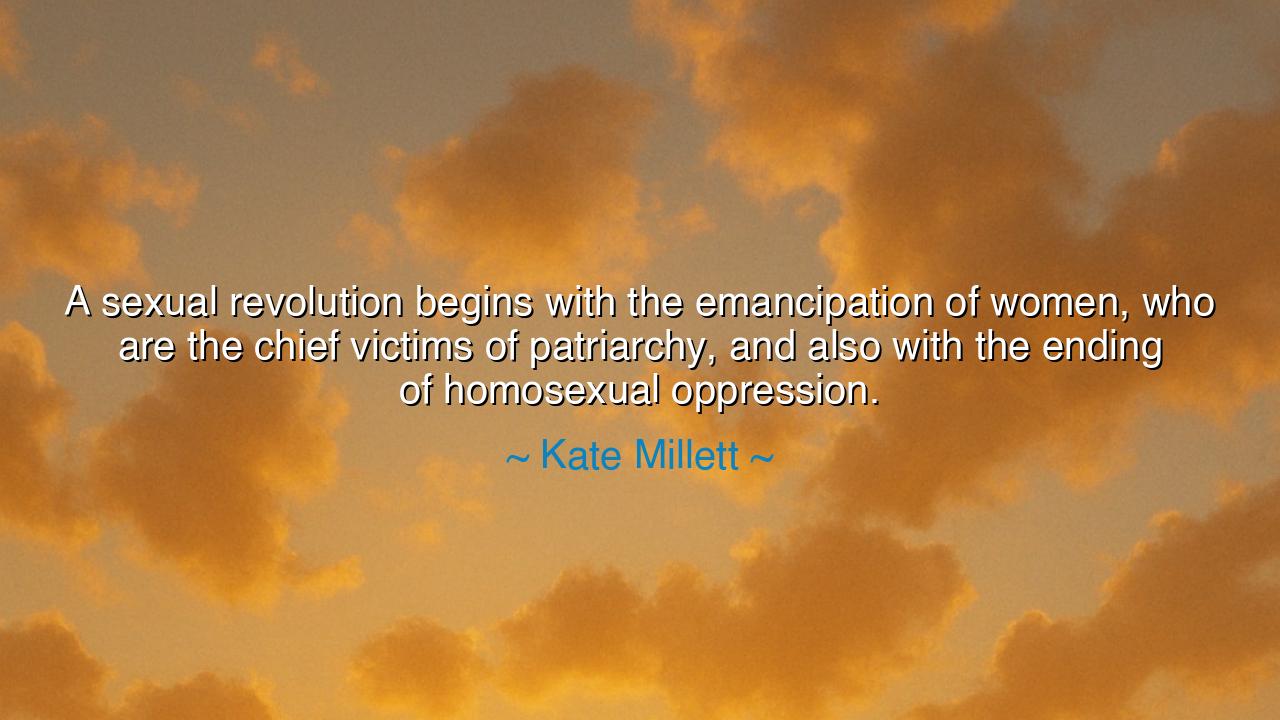
A sexual revolution begins with the emancipation of women, who
A sexual revolution begins with the emancipation of women, who are the chief victims of patriarchy, and also with the ending of homosexual oppression.






Kate Millett, prophetess of a new age, spoke of a truth that pierces like a spear through the armor of old empires: a sexual revolution begins with the emancipation of women. For women have long borne the chains of patriarchy, their labor taken, their voices muted, their very bodies treated as fields to be owned. To free them is not a small reform, but the breaking of an ancient yoke. Without their liberation, no society can claim justice, no people can call itself whole.
But Millett does not stop there. She names also the ending of homosexual oppression as essential to the revolution. For if freedom is granted to some but withheld from others, then it is a hollow freedom. Those who love differently, long cast into shadow, denied the dignity of open life, suffer under the same dominion of patriarchy that subjugates women. Thus the cause is shared, the struggle entwined; only when all are lifted can any truly rise.
History gives witness to this truth. In 1969, at the Stonewall Inn, the oppressed struck back. Men and women, gay and trans, weary of raids and humiliation, ignited a fire that spread across the land. Their rebellion, born of desperation, became the dawn of a movement. Just as the suffragettes once stood in the streets, demanding the vote, so too did these children of Stonewall stand, demanding their humanity. Here we see Millett’s vision unfolding: women and the queer rising together, unraveling the old order.
Let us not mistake her words as mere counsel for a single generation. They are an oracle for all time. A true sexual revolution is no passing storm of passion, but the remaking of human bonds, where love is free, and power no longer flows from domination. It demands courage, the endurance of struggle, and the refusal to be silent.
Thus, to the children of the future, hear this: freedom is indivisible. If women are bound, then men are not free. If the homosexual is shamed, then all love is diminished. Only when the emancipation of women and the ending of homosexual oppression are made real, shall humanity stand upright, unshackled, and radiant in its wholeness.






TPPhung Thien Phuoc
I agree with Millett's perspective, but it’s troubling to think about how far we still are from truly emancipating both women and LGBTQ+ individuals. How can we move beyond just talking about liberation and take meaningful action to change societal structures? Is it enough to change laws, or do we also need to shift deeply ingrained cultural norms to allow for real sexual freedom and equality for everyone?
MNNguyet Minh Nguyen
This quote by Kate Millett makes me think about how oppression is often intertwined and affects various communities differently. If we are to have a true sexual revolution, shouldn’t we start by addressing the root causes of patriarchy, which limits freedom for both women and the LGBTQ+ community? Can these changes happen without addressing the structural inequalities that allow these systems of oppression to persist in the first place?
TYTrinh Yen
Millett’s point about the sexual revolution starting with the emancipation of women and the end of homosexual oppression is crucial, but I question how we begin to tackle both issues simultaneously. The struggles of women and LGBTQ+ individuals are often interconnected, but is there a risk that focusing on one might overshadow the other? How can we create solidarity across these movements to ensure that no group is left behind in the fight for liberation?
VDVan Dinh
Kate Millett's statement is powerful because it connects the fight for women's emancipation with the broader struggle against all forms of oppression, including homophobia. It makes me wonder, can we truly have a sexual revolution if we continue to live in a society that upholds patriarchal values? How do we dismantle these systems of power, and what role does education and societal change play in achieving this freedom for both women and the LGBTQ+ community?